| Srl | Item |
| 1 |
ID:
110975
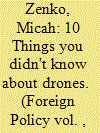

|
|
|
|
|
| Publication |
2012.
|
| Summary/Abstract |
In 1998, U.S. President Bill Clinton's administration shut down an operation to kill the al Qaeda leader in Afghanistan with cruise missiles, given collateral damage estimates of 300 casualties and only 50 percent confidence in the intelligence. As the 9/11 Commission noted, "After this episode Pentagon planners intensified efforts to find a more precise alternative." In 2000 and 2001, the U.S. Air Force struggled to reconfigure a Hellfire anti-tank missile to fit onto a Predator surveillance drone. Meeting one week before the 9/11 attacks, the National Security Council agreed that the armed Predator was not ready to be operationally deployed. The first known killing by armed drones occurred in November 2001, when a Predator targeted Mohammed Atef, a top al Qaeda military commander, in Afghanistan.
|
|
|
|
|
|
|
|
|
|
|
|
|
|
|
|
| 2 |
ID:
100536
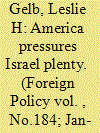

|
|
|
| 3 |
ID:
109106


|
|
|
| 4 |
ID:
103980
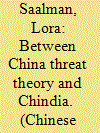

|
|
|
| 5 |
ID:
111954
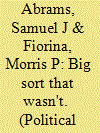

|
|
|
|
|
| Publication |
2012.
|
| Summary/Abstract |
In 2008 journalist Bill Bishop achieved the kind of notice that authors dream about. His book, The Big Sort: Why the Clustering of Like-Minded America Is Tearing Us Apart, was mentioned regularly during the presidential campaign; most notably, former president Bill Clinton urged audiences to read the book. Bishop's thesis is that Americans increasingly are choosing to live in neighborhoods populated with people just like themselves. In turn, these residential choices have produced a significant increase in geographic political polarization. Bishop does not contend that people consciously decide to live with fellow Democrats or Republicans; rather political segregation is a byproduct of the correlations between political views and the various demographic and life-style indicators people consider when making residential decisions. Whatever the cause, Bishop contends that the resulting geographic polarization is a troubling and dangerous development.
|
|
|
|
|
|
|
|
|
|
|
|
|
|
|
|
| 6 |
ID:
141965
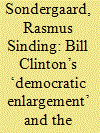

|
|
|
|
|
| Summary/Abstract |
Faced with creating a grand strategy for American foreign policy in the post–Cold War world, the Clinton Administration launched the strategy of ‘Democratic Enlargement.’ This analysis makes two contributions to the existing literature on the topic. First, it investigates the role of Wilsonianism and the ‘Democratic Peace Thesis’ in the discourse of the strategy of ‘Democratic Enlargement’ based on public speeches with a focus on the relationship between democracy and security. Second, it utilises securitisation theory to analyse how Clinton’s Administration used the linkage of democracy and security to legitimise humanitarian interventions in Haiti and Kosovo. By addressing ‘Democratic Enlargement’ in security terms, the Administration securitised democracy promotion and, thereby, created a discourse that helped legitimise a gradual move towards a more militaristic foreign policy during Clinton’s presidency. This discourse offered arguments later utilised by the George W. Bush Administration.
|
|
|
|
|
|
|
|
|
|
|
|
|
|
|
|
| 7 |
ID:
094725
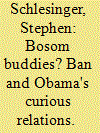

|
|
|
| 8 |
ID:
111750


|
|
|
| 9 |
ID:
121228
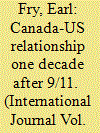

|
|
|
|
|
| Publication |
2012.
|
| Summary/Abstract |
The decade since the events of 11 September 2001 was difficult for the United
States. The nation endured its worst recession since the Great Depression
during the period from December 2007 to June 2009. Many Americans
suffered through a "lost decade," with fewer non-farm payroll jobs in
November 2011 than at the beginning of 2001.1
Median real household
income was also higher in 2001 than in 2011.
|
|
|
|
|
|
|
|
|
|
|
|
|
|
|
|
| 10 |
ID:
093800
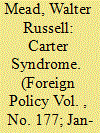

|
|
|
|
|
| Publication |
2010.
|
| Summary/Abstract |
Barack Obama might yet revolutionize America's foreign policy. But if he can't reconcile his inner Thomas Jefferson with his inner Woodrow Wilson, the 44th president could end up like No.39
|
|
|
|
|
|
|
|
|
|
|
|
|
|
|
|
| 11 |
ID:
107237
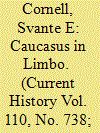

|
|
|
|
|
| Publication |
2011.
|
| Summary/Abstract |
"The fallout of Russia's invasion of Georgia has yet to be seriously addressed;Armenia and Azerbaijan are edging toward a new war; and the situation in the North Caucasus is going from bad to worse."
|
|
|
|
|
|
|
|
|
|
|
|
|
|
|
|
| 12 |
ID:
091462
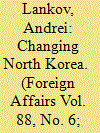

|
|
|
|
|
| Publication |
2009.
|
| Summary/Abstract |
By exposing them to the truth about their impoverishment and about the prosperity of their South Korean cousins, the United States can encourage North Koreans to change the regime in Pyongyang.
|
|
|
|
|
|
|
|
|
|
|
|
|
|
|
|
| 13 |
ID:
086467
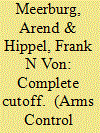

|
|
|
|
|
| Publication |
2009.
|
| Summary/Abstract |
President Barack Obama has pledged to "lead a global effort to negotiate a verifiable treaty ending the production of fissile materials for weapons purposes."[1] Fissile materials are the chain-reacting fissionable materials that are the essential ingredients in nuclear weapons, in practice, highly enriched uranium (HEU) and separated plutonium. Obama is not the first president to back the negotiation of such a treaty: President Bill Clinton did so after the UN General Assembly in 1993 adopted by consensus a resolution calling for negotiation of a "non-discriminatory, multilateral and internationally and effectively verifiable treaty banning the production of fissile material for nuclear weapons or other explosive devices."[2] Even the administration of President George W. Bush tabled a draft treaty at the Geneva-based Conference on Disarmament (CD), albeit without international verification.
|
|
|
|
|
|
|
|
|
|
|
|
|
|
|
|
| 14 |
ID:
073548
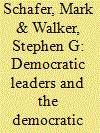

|
|
|
|
|
| Publication |
2006.
|
| Summary/Abstract |
Do the beliefs of leaders make a significant difference in determining if democracies are peaceful and explaining why democracies (almost) never fight one another? Our comparisons of Prime Minister Tony Blair and President Bill Clinton reveal that both leaders view democracies as more friendly than nondemocracies, and they have significantly less cooperative beliefs toward the latter than toward the former, a difference that extends to the behavior of their respective governments during the Kosovo conflict. We also find that individual differences in the operational codes of the two leaders matter in the management of conflict with nondemocracies; the leaders exhibit opposite leadership styles and behavior associated with the domestic political culture of the two states. Overall, these results support the dyadic version of the democratic peace and suggest that the conflict behavior of democratic states depends upon the beliefs and calculations of their leaders in dealing with nondemocracies.
|
|
|
|
|
|
|
|
|
|
|
|
|
|
|
|
| 15 |
ID:
107344


|
|
|
| 16 |
ID:
086468
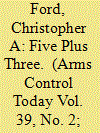

|
|
|
|
|
| Publication |
2009.
|
| Summary/Abstract |
The Obama administration has stated its intention to conclude a treaty cutting off production of fissile material, highly enriched uranium (HEU) and plutonium, for nuclear weapons. So did the administrations of George W. Bush and Bill Clinton. Although a fissile material cutoff treaty (FMCT) has been a key objective of the UN Conference on Disarmament (CD) for many years, that organization seems unable to break out of its now customary paralysis.[1] This experience should encourage the Obama administration, if indeed it wants such a treaty, to look to another forum for realization. More importantly, it may be vital for the new U.S. administration to take a different approach because pursuit of an FMCT as currently contemplated at the CD might well have the ironic and presumably unintended consequence of gravely undermining the nuclear nonproliferation regime. Fortunately, such a new approach may well be available.
|
|
|
|
|
|
|
|
|
|
|
|
|
|
|
|
| 17 |
ID:
101304
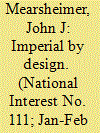

|
|
|
| 18 |
ID:
106383
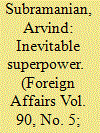

|
|
|
|
|
| Publication |
2011.
|
| Summary/Abstract |
Is China poised to take over from the United States as the world's leading economy? Yes, judging by its GDP, trade flows, and ability to act as a creditor to the rest of the world. In fact, China's economic dominance will be far greater and come about far sooner than most observers realize.
|
|
|
|
|
|
|
|
|
|
|
|
|
|
|
|
| 19 |
ID:
128924


|
|
|
| 20 |
ID:
101611
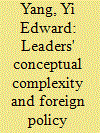

|
|
|
|
|
| Publication |
2010.
|
| Summary/Abstract |
Present research on foreign policy change (FPC) focuses on systemic-structural variables and domestic politics as key causal factors motivating states to change their foreign policy behaviour. Recent works also look towards decision context and bureaucratic politics to explain FPC. 1 In this article, I concur with Walter Carlsnaes 2 in arguing that attention should focus more on exploring the role of human agents, i.e. leaders that make actual foreign policy decisions, when explaining and predicting FPC. Specifically, I use the leadership traits analysis (LTA) framework to argue that a leader's level of conceptual complexity interacts with external stimuli (system- and/or domestic-level factors) to affect: (i) the leader's willingness to change course in response to policy failure and (ii) the type of changes that the leader is likely to carry out.
|
|
|
|
|
|
|
|
|
|
|
|
|
|
|
|